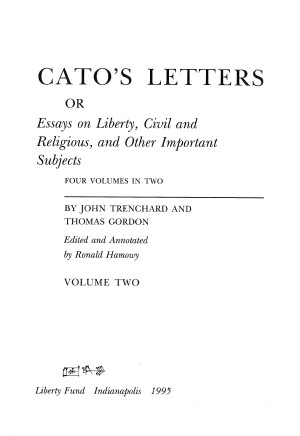
Part of: Cato’s Letters, 4 vols. in 2 (LF ed.) Cato’s Letters, vol. 2 June 24, 1721 to March 3, 1722 (LF ed.)
- Thomas Gordon (author)
- John Trenchard (author)
Volume 2 of a four volumes in 2 set. Almost a generation before Washington, Henry, and Jefferson were even born, two Englishmen, concealing their identities with the honored ancient name of Cato, wrote newspaper articles condemning tyranny and advancing principles of liberty that immensely influenced American colonists.
Show more
The Englishmen were John Trenchard and Thomas Gordon. Their prototype was Cato the Younger (95-46 B.C.), the implacable foe of Julius Caesar and a champion of liberty and republican principles. Their 144 essays were published from 1720 to 1723, originally in the London Journal, later in the British Journal. Subsequently collected as Cato’s Letters, these “Essays on Liberty, Civil and Religious” became, as Clinton Rossiter has remarked, “the most popular, quotable, esteemed source of political ideas in the colonial period.”
Key Quotes
Presidents, Kings, Tyrants, & Despots